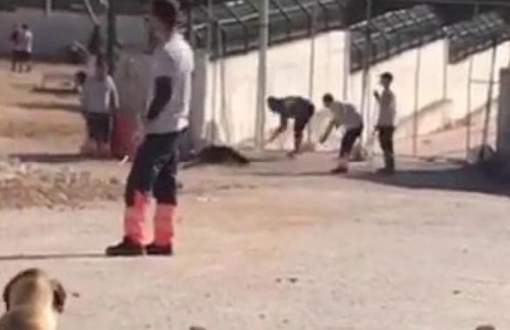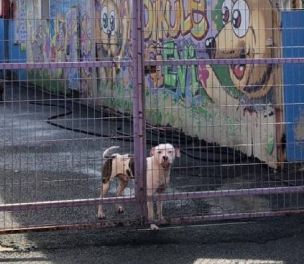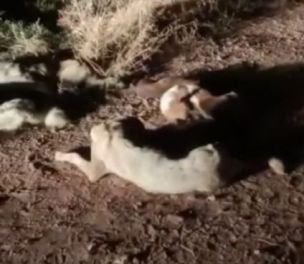A dog was beaten to death in a municipality animal rehabilitation center in Konya, central Türkiye, footage circulated on social media showed.
Images of the battering quickly spread across the internet, with the hashtag #Konyadakatliamvar (There is a Massacre in Konya) being tweeted over 70,000 times in 12 hours.
The commotion prompted the Animal Rights Center of the İstanbul Bar Association to take legal action, and Paw Guards, a stray animal protection association, announced that they would leave from Ankara to Konya today (November 25) with a free bus, calling on everyone to join.
The Konya Metropolitan Municipality issued a statement this morning that investigations have been launched after seeing the images, and the governor's office later confirmed that two people were taken into custody.
Stray animals debate
The video comes amidst increasing debates surrounding stray animals in Türkiye. An estimated 600 million stray animals roam around worldwide, and about 10 million reside in Türkiye alone, which means around one stray animal per eight citizens.
Unsurprisingly, animals are a common sight in the country's urban centers and countryside, with İstanbul's stray dogs and cats becoming documentary stars in the last years. Yet, the country's relationship with stray dogs, in particular, is long, complex, and not always 'loving'.
In a recent survey, 34.4 percent of people found stray animals dangerous, and 39.4 percent believed they should be collected and taken to shelters. Furthermore, around 27 people lost their lives this year to stray dogs, with Children being especially subject to dog attacks, such as a 10-year-old boy from Bitlis passing away after being bitten by a rabid dog on November 9.
The death of the boy caused public uproar and reactions by Türkiye's opposition party, CHP, naming it "shameful" that in ""The Türkiye of the Century," people still die from rabies, a disease not seen in many other developed countries."
On November 17, when President Erdoğan was asked about the incident, he emphasized that municipalities should take the animals off the streets and place them in newly built shelters, citing Konya municipality as doing exemplary work. Sheltering animals is an often-coined phrase by the President to solve the "stray question", as throughout the AKP's rule, animal centers grew from 120 in 2002 to around 250 in 2022.
Stray animals are not necessarily dangerous
The European Court of Human Rights (ECHR) also acknowledges the legal obligation to protect people from street animals.
In 2011, the ECHR ruled that Romania violated article 8, failing to take adequate actions to safeguard the physical and psychological integrity when in 2000, a woman was attacked by a pack of stray dogs in front of her home in Bucharest, severely injuring her and leaving her disabled.
Protecting public health while simultaneously protecting stray animals' right to life and freedoms has become a careful balancing act. President Erdoğan's remarks led to 21 bar associations issuing a joint statement, reminding that the confiscation of stray animals is against the Animal Protection Law.
Law no. 5199, enacted in 2004, stipulates that stray animals can only be taken in for vaccination, treatment, sterilization, and rehabilitation. Afterward, They need to be released back into their environment.
Free-roaming stray animals are also not necessarily a hazard as long as they are fed and nurtured, which is the duty of the municipalities, according to Haydar Özkan, Vice President of the Confederation for the Rights of Animals (HAYKONFED).
Over 1,000 animals died in four months
Municipal obligations are recognized with the passing of Law no. 7332 on July 14, 2021, which entails that all metropolitan municipalities must establish a nursing home for animals by December 31, 2022, and district municipalities have time to open these centers until December 31, 2024. Furthermore, people can now face up to 4 years of prison when deliberately killing an animal, whether it is owned or not.
However, it is precisely these shelters that are under severe public scrutiny, with the incident at the Konya animal rehabilitation center renewing concerns about their conditions and treatment of animals. In January this year, 1,062 cats and dogs died in four months in Elazığ Municipality's animal shelter. These unusual figures led to suspicion that these animal shelters act as a sort of concentration camp where an animal genocide is taking place.
Shocking as it may be, using concentration camps to solve "the stray question" is nothing new. On June 3 and 4, 1910, Mayor Suphi Bey decided to gather 80.000 of Istanbul's dogs and deport them to an island (Haysızada) close to the city that had been used before to exile dogs. People in the city could hear the howling of dogs for days until they all starved to death. This incident remains still one of the largest animal genocide in the world. (WM/VK)







.jpg)
bhjbh.jpg)
.jpg)


.jpg)
.jpg)
.jpg)
.jpg)
.jpg)